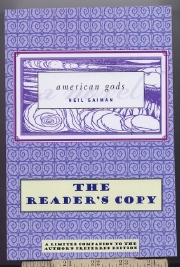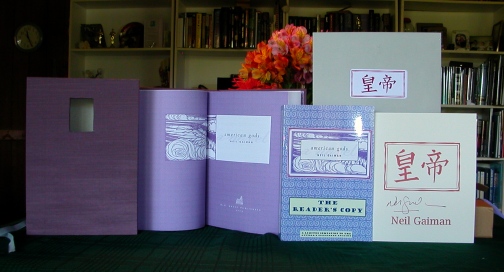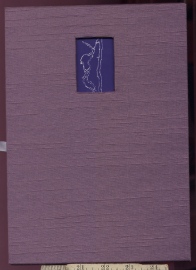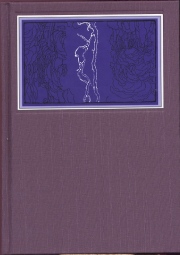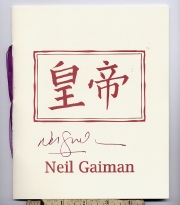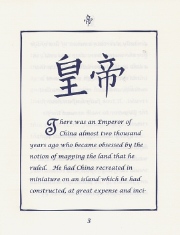Why Do We Buy?
Because It's A Limited
Edition of Neil Gaiman
A
Glorious Book Gives Rise
To Questions as Well
As Credit Card Limits
The Agony Column for July 12, 2004
Commentary by Rick Kleffel
I'm in it
now, big-time. It's no surprise I find myself in this situation.
It was almost twenty years ago when I bought my first
limited edition reprint of a book then available as a paperback.
That was the Scream/Press edition of Clive Barker's 'Books of
Blood', and it's still one of my favorite books. But when I use
the phrase "favorite
books", like that, I'm not saying what is usually meant by
that phrase. Because, when somebody says, "Oh, that's one
of my favorite books!", the book in question could actually
be any version of the book in question. "Favorite books" usually
refers only to the content of the book; the words on the printed
page, not the pages themselves and the covers that contain them.
In much the same way, a deluxe or limited edition of a book can make the reading experience nicer. So when I say that the Scream/Press edition of 'The Books of Blood" is one of my favorite books, I mean not just the contents, but the presentation as well -- the actual physicality of the book itself.
I'm not going to address collectibles here. I want to talk about book-objects, in particular some of the most magnificent book-objects I've had the fortune to happen upon in quite some time. I wrote a news column about my discovery of the beautiful limited editions of Neal Stephenson's 'Baroque' trilogy. Stephenson's work has never been done up in deliberately limited editions before and I was shocked at the amazing quality of what was offered by HarperCollins. HarperCollins? Yes, they had actually released upon initial publication, a 5,000 copy signed edition of 'American Gods', which was precisely what I describe above; the trade edition with an extra page pasted in, but at no extra cost to the reader, a welcome delight.
Yes, you heard me right, Neil Gaiman's books. Content and presentation. Not kicked up a notch. Launched into the American God-Damned stratosphere. I'm going to give my readers a few minutes to gather their credit cards. Credit cards were made for this sort of thing. Got 'em? Cozy? Ok, settle back while I peel away the layers of care, creativity and craft that make the Hill House Neil Gaiman subscription a must buy for readers of all stripes and all income levels.
The book itself is also bound in purple Japanese silk with a lovely lightning bolt print set in the cover. Inside, look for a larger format -- 7" by 10" and a two-color text printing process that renders chapter titles and other interstitial material in purple, with the bulk of the text in a nice deep black. The pages are evenly cut. The sunset purple coloring is carried on in the interior, for each of the part of the novel. What you have here is nothing less than another gloriously designed work of book-art. Nothing less -- but quite a bit more. In all the important ways.
But that's beside the point because there are no rules as far as Hill House goes. The book's the thing. And the book is more than a single thing. One of the great posers of reading your beautiful editions is the problem of Salsa Splatter. That is, you might relish reading your book while eating in a Mexican restaurant or even at home, but the very beauty that makes these books such a pleasure makes them a hazard to read in the great, wide world. For that, Hill House goes to an unprecedented length by supplying a very nice trade paperback copy of the extended, expanded work you're reading in your treasured hardcover. This is clearly a case of eating your book and having it to. I've never in my many years of reading and buying books seen a publisher go to this length to ensure reading satisfaction. It clearly must be rewarded! OK, put down your credit card. I'm *still* not done. Hill House Publications are sort of like Christmas presents. Yes, there's the main attraction, but the extras are well worth your attention. For example, if you bought your limited Stephenson from the publisher direct, you get a poster written in "Real Character" which, if you can translate it, will give you instructions for claiming a prize. The whole process is every bit as arcane as the books themselves. Seems pretty fitting to me. And if you buy the Gaiman, you get the book itself, the reading copy and an additional story -- they call it a Christmas Booklet. It's like finding a Walkman in your stocking. Here you get a parchment setting of an interstitial story that was to appear in the novel, but Neil himself decided not to use it. What more could you ask than to have one of Neil's beautiful fables printed on vellum? Well, you could start with a request that the publisher ship it in such a way that it arrives unbent -- and they do. This package has been living on my living room / dining room display table for over a week now. It took me a while, frankly, to come down off my slack-jawed drooling high and even begin to sound coherent about it. And I realize that this is not the most objective piece of critcism I've ever written. That's the point.
But wait -- there's more. This is just the first of a series of Gaiman re-issues. Hill House is planning this treat for 'American Gods', 'Neverwhere', 'Stardust', 'Smoke and Mirrors', and 'Coraline'. Their website will give the details of what they call 'The Neil Gaiman Subscription'. Each of the books will be what they call "the author's preferred edition", which simply put means more words. But Gaiaman has also edited and massaged the current content so expect, not only longer versions, but better versions. Buying as a subscription gets you not onoly goodies like the "Christmas Pamphlet", it also gets you a screenplay which we've never seen. It's all simply mind-boggling in a physical book sense. Now look, I know: $200.00 seems like a lot of money. But really, it's not. Not when you're getting something that is this beautiful and has as much resonance as this. I mean, I just paid $99.83 for a pair of damned shoes. Who cares about shoes? Surely not I, not when there are books like this to be had. In point of fact, there's probably more leather in a some of the leather-bound books out there than there is in my damn shoes, which are already falling apart. Life offers few chances for us to design perfect moments, slices of time set aside for an activity that is god-damned guaranteed to be rewarding on all levels -- visceral, mental, sentimental. But limited editions such as these allow ardent readers to set down a stake in time, when all aspects of reading -- the presentation, the content, the extras -- are there, ready to assemble themselves in the minds of the reader into something more than life, more than memory. Who needs shoes anyway? I'm staying home to read. |
